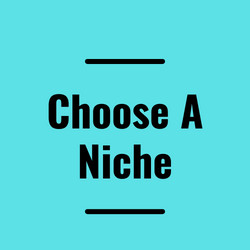
The first, step in amateur blogging is to find a niche that allows you to showcase your expertise. Finding your niche ensures your content is both unique and valuable.
The second step is to give your blog a memorable identity. To do this, choose a catchy blog name that reflects your niche.
Next, select a user-friendly blogging platform. Choosing a blogging platform like self-hosted WordPress allows you the freedom to customize your blog’s design so it reflects your personal style and brand.
Finally, start you amateur blogging by journey creating valuable fun content. Begin with an introduction post that clearly defines your blog’s purpose and sets expectations for your readers.
Now you can unleash your blog’s potential by promoting it on social media platforms. In addition, start building connections with fellow bloggers.
You need to engage in blogging communities and foster meaningful relationships with your readers as well. This goes a long way toward cultivating a loyal following.
Quick Summary
This blog post provides a comprehensive guide for amateur bloggers. It covers topics such as choosing a niche, naming your blog, selecting a blogging platform, designing and building your blog, starting to blog, promoting your blog.
Then it goes into the advantages of amateur blogging. It also highlights common mistakes to avoid and provides useful tools for bloggers. Ultimately, it emphasizes the importance of passion, consistency, and engagement for successful amateur blogging.
Start Amateur Blogging
Remember, amateur blogging is about sharing your ideas with others. Don’t worry too much about making everything perfect, just start creating and see where it takes you! So let’s get started:
Disclosure: This article may contain affiliate links. It means if you purchase a product by clicking on a link, I may be paid a small commission as a reward for my efforts. This doesn’t cost you anything extra. Thanks for your kindness.
1. Identify Your Niche

Think about the things you enjoy doing, hobbies or special talents you have.
This helps you identify a specific topic or niche that you are passionate about. And it gives you an opportunity to showcase your skills.
(You can read more details here.)
The other important reason to choose a niche is to identify a target audience. This means connecting with a select group of people who share a common interest or problem.
From this point you can create a micro niche blog and share content or products that meet the needs of your audience.
Here is where a niche finder tool comes in handy. Using one it makes is easier to get started.
2. Name Your Blog
Always think about your prospective readers when you choose your blog name.
Choose a name that reflects your blog’s niche or topic. Your blog name should be relevant to your blogs topic and its content.
Pick a blog name that is simple and easy to remember. Avoid complicated or hard-to-spell names that could confuse your readers. Short catchy blog names are usually easier to remember.
Make it unique: Choose a name that is different from other blogs in your niche. This is one way to make your blog stand out so it doesn’t get confused with similar names.
And finally avoid using hyphens or numbers. It’s best to keep your blog name easy to type. Using hyphens or numbers in your blogs’ name not only makes it look unprofessional but it also makes it difficult to remember.
3. Choose A CMS Platform
Blog platforms are sometimes referred to as Content Management Systems, or CMS for short.
Here is a list of things to keep in mind when choosing a CMS platform for your blog:

Features
Look for a platform that offers the features you need.
For example, if you want to monetize your blog, make sure the platform allows you to add ads.
Customization
Pick a platform that allows you to customize your blog to fit your needs. Look for options to change themes, fonts, adjust layouts, and colors.
Community
Pick a platform that allows you to customize your blog to fit your needs. Look for options to change themes, fonts, and colors.
Web Hosting
Consider whether you want to host your blog on a self-hosted platform or a hosted one.
Self-hosted platforms require you to find and pay for hosting, whereas hosted platforms take care of this for you.
Ease of use
Choose a platform that is easy to use, even if you don’t have technical skills. Look for a platform that has a simple interface and provides tutorials and support.
Some popular blogging platforms include WordPress, Blogger, and Tumblr. Choose the one you think is best for your needs and goals.
4. Get Web Hosting
It’s important whether you want to self-host your amateur blog or you want to have it hosted. When you blog on a hosted blog platform, there are some restrictions. But using the platform doesn’t cost a fee.
On the other hand, when you self host your blog, you have to sign up with a hosting provider and pay a fee.
Self-hosting takes a little more effort than using a hosted blogging platform. However, self-hosting your blog gives you greater control over it.
This includes the freedom to monetize your amateur blog the way you want. It also gives you the opportunity to grow as much as you need to.
5. Design and Build Your Blog
Next step is to choose a theme and begin customizing it. The blogging platform you selected may provide some help.
The first step is to install your Content Management system. Many hosting providers now include one-click installation when you buy blog hosting services.
Next you will choose a pre-designed theme or customize an existing one. You can style your blog using colors, fonts and layouts and images to create your own brand.
Now install some software and plugins that will improve the functionality of your site. Some essential plugins are Security, SEO and Caching plugins.
Finally it’s time to start creating your blog content. Your blog content includes articles, posts, images and graphics that you want your users to access.
Be sure to optimize your content for SEO from the start. When you do that it makes it easier for search engines to find and share your amateur blog with the right audience.
There are also many tools you can use to help you optimize your blog content.
However, if you are not comfortable with building your own blog, you can find a web designer on a marketplace like fiverr.com or upworks.com to do it for you.
6. Create Captivating Content
Before launching your blog, ensure you have the necessary pages. You should also have at least five pieces of content to share.
Share your blog with your friends, family, and social media followers to gain readers.
Encourage your readers’ engagement by responding to their comments. And don’t forget to promote your blog on social media.
Keep your content simple and easy to digest. This helps build emotional connection with your readers.
Create and publish content regularly. It’s a great way to keep your readers engaged and interested.
7. Promote Your Blog
Amateur blogging success depends on your ability to reach the right audience. You can use a number of ways to promote your blog.

Using social media is great for promoting your amateur blog. The idea is to find social media groups and online forums that you can join.
Become involved with these platforms. But remember to follow the rules. Don’t spam.
You can also use paid ads to promote your amateur blog.
Although you’re blogging for fun, there are a number of ways to make money from blogging.
The more you promote your blog, the more opportunities will open up for you to monetize your amateur blog.
Cost to Start A Blog
So how much does it cost to start amateur blogging? It really cost very little in terms of cash investment. A couple hundred dollars can go a long way.
In fact, if you have a laptop and good wi-fi connection you are halfway there.
The real cost is the time and effort you are willing to invest. There are tons of free useful tutorials all across the internet that you can use for guidance.
Alternatively, you can find freelancers on the web who are willing to build out your blog for you. But do diligent research and be specific about what you want.
Advantages of Amateur Blogging
There are a number of advantages to amateur blogging. These are a few of them.
Amateur Blogging Advantages
- Blog about what you love.
- Post from anywhere.
- Blog anytime-night or day.
- Easily Monetize your blog.
- Connect with people who share your interest.

Once you have those you can start your blog.
Although amateur bloggers do not start with the intention of making money, they can earn significant income. The key is to learn to do this.
Difference Between Blogging and Vlogging
A blog is short for weblog. It is basically an online journal. It’s a documentation of experiences and expertise you want to share.
Amateur blogging is a great way to communicate with people who share your interest in a specific topic.
Blog posts vary in length and are displayed with the latest entry being shown first. Other media such as images, graphics and videos are often included in blog posts.
On the other hand, a Vlog is short for video blog or video log. It is the blogging done in video format. Vloggers make and embed videos and share online.
Travel vlogging is an extremely popular form of vlogging. Travelers shoot, embed, and share videos of their travels on sharing platforms such as YouTube.
Professional vs Amateur Blogging
Professional bloggers work as freelancers or they are hired by companies. They are happy working within guidelines set by the company they blog for.
While amateur bloggers do it in their free time.
Professional Bloggers
They get paid to manage a company’s online reputation, build brand awareness or communicate with customers about new developments in the company.
The goal of professional bloggers is to convince their audience to take a specific action. Usually the action leads to some sort of conversion including sales.
So, what do professional bloggers earn? According to Indeed.com, bloggers in Seattle Washington are the highest paid in the United States. They earn approximately $30.00 an hour.
Amateur Bloggers
On the other hand there are bloggers who just want to share what they love doing with others.

Amateur bloggers cover topics such as Finance and Money management, Parenting, Health and Wellness.
Other popular topics they blog about are Fashion, Beauty, and Personal development.
These bloggers have the flexibility to cover a topic from any angle they choose.
This allows them to flex their skills in a particular area.
Amateur blogs are often referred to as personal blogs.
Amateur bloggers have the freedom to decide who they want to read their blog. In addition, they are free to choose the type of content they want to create and how often they want to do it.
Tools for Bloggers
Professionals invest in high quality tools. An amateur blogger should do the same if they are serious about growing their blogs.
However amateurs can find cost effective tools for use for amateur blogging.
There are tons of great free tools on the internet that you can start with. Of course as your blog grows you may need to upgrade. So what are the tools you need to start with?
Niche Finder tool This is your best friend. Use it to find and define your audience.
Post scheduler. Scheduling software saves a lot of time. They allow you to post to different platforms at predefined times..
Image editor. Start with simple, easy to use image editing software. One that removes background and basic photo enhancements will be sufficient in the beginning.
As your blog grows you will need to invest in something with more capabilities.
Autoresponder. Autoresponders are pieces of software that allows you to collect data from your site visitors.
That way you can stay in touch with them and keep bringing them back to your amateur blog.
However, when using an autoresponder, keep in mind that there are laws that govern collecting and using people’s data. You will hear them referred to as GDPR compliance rules. Be sure to follow these rules carefully.
I know this sounds like a lot, but it’s not. And if your amateur blogging is done right these small investments pay for themselves many times over.
FYI-Interesting Blogging Stats
According to Envisage Digital there are 4.4 million blog posts published across all platforms every day.
Here are some current statistics at the time of writing this post:
- The average blog post is 1150 words. But readers only spend 18 seconds on a blog post page.
- WordPress hosts 77 million new blog posts each month.
- Globally there are 455 million WordPress websites.
- 409 Million people read WordPress blogs each month.
- There are about 450 million blogs on Tumblr.
Source: Envisage Digital
Although starting an amateur blog sounds like a monumental task, it can be fun. Amateur bloggers can be successful. They just need focus on a few important things that will help them reap massive results.
Blogging Mistakes to Avoid
There are a few costly mistakes all new bloggers make. Five of them are listed below. Try yor best to avoid making these blogging mistates.
- Failing to define their niche. Before you write the first sentence in you first post, you need ask yourself three questions:
Defining a niche will help you reach the right audience. This also makes it easier to monetize your amateur blog.
- Ignoring keyword research. There are many keyword tools online that will help you narrow down your topic so you can determine which audience you want to reach.
keyword tool will allow you get important data. You can learn how many people are interested in your topic. Not only that you can see the exact terms they search for.
- Not investing in a domain. Your domain is your identity on the web. It is where people will search for you. It is your own piece of the Internet. You need a domain.
Pick a great domain that makes it easy for your audience to find you.
- Choosing the wrong hosting There are many great free blogging platforms out there. But they can limit your potential for growth.
However, as an amateur blogger you want to have total control over your blog content. So choose the best blog hosting platform.
This will give you the freedom to build and grow your blog without restrictions.
- Underestimating the work involved. It takes a lot of work to get your amatuer blog to start making significant money.
Many amateur bloggers begin by writing a number of posts without a deliberate strategy. They hope that at least one of them will get picked up. The fact is this strategy seldom works unless it’s an exceptional post.
Creating blog posts takes a lot of time and effort. So take the time to research, create your articles and schedule when to post them.
Summary
In a nutshell before you start your amateur blogging journey you need to decide what you want to blog about and create a plan.
- Identify the theme of your blog. That is called a niche.
- Secure a unique blog name that reflects your blogs’ personality
- Search for people who are interested in your content and develop a strategy to engage with them.
- Start Blogging.
By consistently delivering high-quality content tailored to your target audience, your blog will grow and thrive over time.
Remember to savor the joys of sharing your unique voice with the world.
Let this guide be your compass as you navigate the captivating world of blogging. Relish every step of the way. Happy blogging!



